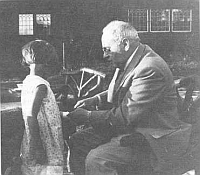足腰を鍛えようとしている。毎朝の散歩の習慣は 両方で1キログラム。大股で速足で歩く。家ではテレビを見ながら教えて貰ったスクワット。自己流のものを加えて 何種類かで1時間半はやっている。ここに来て「プロの人たち」の教えを知った。
太腿の筋肉の鍛え方。足首に重りを巻き付けて、有効運動もメニューに加えよう。「新しい習慣」作りを毎週のようにチャレンジしているが、「メンタルに強くなる方法」、「共同体の一人の感覚」。「幸せになる5つの方法」など ざっとおさらいをしてみた。
「選択をする自由」は、「31歳の時から」ずっと続けている。なので新しい世界を求めて、転職を何度か繰り返した後、自立した。1999年のことだ。どこかに雇われてから「足」を洗い独立。去年より第2創業の会社に参画した。新鮮で神聖な「ヘルスケアと医療」の世界。わくわく感が止まらない。あ~しあわせ。
偉大な賢人 お二人の人生と生き方については ウィキぺディアから抜粋を下記に掲載したので なぜ 世界的なご本を書かれ 今に生きる私たちを励ましているいるのか?。素晴らしい社会を創ろうとする姿勢も学ばせて頂きたい。これを読まれた方々とご一緒に、「今からでも出来ること」は何でもしよう。さあ闘志を燃やそう。
備考ー1 スティーブン・コヴィー(Stephen Covey)
備考ー2 アルフレッド・アドラー(Alfred Adler)
★劣等感を沢山持っていた。アドラー心理学を早く知っておけばと思った。
___________
足腰を強くする筋トレ『スロースクワット』【362,230 回視2019/06/11  50代・60代の健康チャンネル 登録 8790人 登録済み 西住之江整体院チャンネル
50代・60代の健康チャンネル 登録 8790人 登録済み 西住之江整体院チャンネル
___________
___________
Squats For Beginners: How to do a Squat Correctly 6,172,123 回視聴 2016/09/01  Bowflex チャンネル登録 61.3万人 登録済
Bowflex チャンネル登録 61.3万人 登録済
_________________
_________________
【アドラー心理学】最高の幸福感『共同体感覚』とは|しあわせ心理学 ★この考え方になると有難い。自分は生かされていると思う。
_________________
__________
Alfred Adler on film (1929)
________________
________________
Rounder Side Butt | Great for Beginners
★これは足腰を鍛えるのに、いい方法だ。彼女の下半身には圧倒されるが、この運動をづっと続けて作られたものだと考える。逞しい足腰とお尻は見事だ。これならヨタヨタして歩くことはないだろう。build your butt とある。
____________
____________
7つの習慣・コヴィーさんが教えてくれた『命の次に大切なもの』51,340 回視聴 2020/03/08  心理カウンセラー・ ラッキー
心理カウンセラー・ ラッキー
★人間には選択の自由がある。その通りだ。たずさわらなかった業界はない。と思っている。次々に魅力的な人々や異なった業界に憧れて、「消化試合はしたくないと思い、転職を繰り返した。天職探しで人生は豊かで明るいものになった、未だにわくわくしている。
___________
___________
THE 7 HABITS OF HIGHLY EFFECTIVE PEOPLE BY STEPHEN COVEY – ANIMATED BOOK SUMMARY 7,589,356 回視聴 2015/03/29  FightMediocrity 登録者数 117万人登録済
FightMediocrity 登録者数 117万人登録済
____________________
____________________
___________
___________
元気!いきいき!!体操 07筋力トレーニング
___________
___________
幸せになるたった一つの習慣|しあわせ心理学
___________
___________
脚の筋力UP!一回で効果あり! ★太ももの鍛え方は初めて聴いた。
142,370 回視聴 2016/10/14  高齢者体操TV 登録者数 3760人 登録済
高齢者体操TV 登録者数 3760人 登録済
___________
____________
メンタルが強くなる習慣とは|しあわせ心理学
★この習慣を身に着ければ 若さを保てるぞ。人生がわくわくしてくることを知っている。
____________
____________
スティーブン・リチャーズ・コヴィー(Stephen Richards Covey, 1932年10月24日 – 2012年7月16日)は、アメリカ合衆国ユタ州ソルトレイクシティ生まれの作家、経営コンサルタント。
1952年、ユタ大学卒業。1957年ハーバード・ビジネス・スクールでMBA取得。 1976年、ブリガムヤング大学にて博士号取得。 ブリガムヤング大学で、学長補佐、および経営管理と組織行動学の教授を務める。 フランクリン・コヴィー社(本社アメリカ)の共同創設者であり副会長。 “The 7 Habits of Highly Effective People”日本語訳は『完訳 7つの習慣 -人格主義の回復』の著者として世界的に有名。
英国『エコノミスト』誌によれば、コヴィーは今、世界で最も大きな影響力を持つ経営コンサルタントとされている。妻サンドラ・メリル・コヴィとユタ州プロボに在住。9人の子供と36人の孫を持つ。熱心な末日聖徒イエス・キリスト教会/モルモン教の信徒であり、信者向けの信仰書も執筆している。
著書『完訳 7つの習慣 -人格主義の回復』は3000万部以上の売上げを記録し、日本でも200万部以上が販売されている。さらに38の言語にも翻訳され世界的なベストセラーとなる。また2002年、『フォーブス』誌の「もっとも影響を与えたマネジメント部門の書籍」のトップ10にランクインし、『チーフ・エグゼクティブ・マガジン』誌では「20世紀にもっとも影響を与えた2大ビジネス書」のひとつに選ばれる。
2012年7月16日、自転車事故の負傷がもとでアイダホ州アイダホフォールズの病院で死去。79歳没
The 7 Habits
Covey introduces the concept of paradigm shift and helps the reader understand that” different perspectives” exist, i.e. that two people can see the same thing and yet differ with each other.
Covey also introduces the Maturity Continuum. These are three successive stages of increasing maturity: dependence, independence, and interdependence. At birth, everybody is dependent, and characteristics of dependence may linger; this is the first and lowest stage of maturity.
Dependence means you need others to get what you need. All of us began life as an infant, depending on others for nurturing and sustenance. I may be intellectually dependent on other people’s thinking; I may be emotionally dependent on other people’s affirmation and validation of me. Dependence is the attitude of “you”: you take care of me… or you don’t come through and I blame you for the result.
Independence means you are pretty much free from the external influence [and] support of others. … Independence is the attitude of “I”. … It is the avowed goal of many individuals, and also many social movements, to enthrone independence as the highest level of achievement, but it is not the ultimate goal in effective living. There is a far more mature and more advanced level.
The third and highest level in the Maturity Continuum is interdependence. … We live in an interdependent reality. Interdependence is essential for good leaders; good team players; a successful marriage or family life; in organizations. Interdependence is the attitude of “we”: we can co-operate; we can be a team; we can combine our talents.
— Stephen Covey, The 7 habits of highly effective people (1998)[3]
Each of the first three habits is intended to help achieve independence. The next three habits are intended to help achieve interdependence. The final, seventh habit is intended to help maintain these achievements. Each of the seven habits has a chapter of the book (or a section of the videotape or DVD) devoted to it:
Independence
The first three habits surround moving from dependence to independence (i.e., self-mastery):
1 – Be proactive
- Take responsibility for your reaction to your experiences, take the initiative to respond positively and improve the situation. Recognize your Circle of Influence and Circle of Concern. Focus your responses and initiates on the center of your influence and constantly work to expand it. Don’t sit and wait in a reactive mode, waiting for problems to happen (Circle of Concern) before taking action.[4]
2 – Begin with the end in mind
- Envision what you want in the future so you can work and plan towards it. Understand how people make decisions in their life. To be effective you need to act based on principles and constantly review your mission statements. Are you – right now – who you want to be? What do I have to say about myself? How do you want to be remembered? If habit 1 advises changing your life to act and be proactive, habit 2 advises that you are the programmer! Grow and stay humble.
All things are created twice. Before we act, we should act in our minds first. Before we create something, we measure twice. This is what the principle is about. Do not just act; think first: Is this how I want it to go, and are these the correct consequences?[5]
3 – First things first
-

Matrix of importance vs urgency that Stephen Covey and Dwight D. Eisenhower used in deciding where to invest their efforts.
Talks about difference between leadership and management. Leadership in the outside world begins with personal vision and personal leadership. Talks about what is important and what is urgent. Priority should be given in the following order (in brackets are the corresponding actions from the Eisenhower Matrix):,[6][7]
- Quadrant I. Urgent and important (Do) – important deadlines and crises
- Quadrant II. Not urgent but important (Plan) – long-term development
- Quadrant III. Urgent but not important (Delegate) – distractions with deadlines
- Quadrant IV. Not urgent and not important (Eliminate) – frivolous distractions
- The order is important; after completing items in quadrant I, we should spend the majority of our time on II, but many people spend too much time in III and IV. The calls to delegate and eliminate are effective reminders of their relative priority.
If habit 2 advises that you are the programmer, habit 3 advises: write the program, become a leader! Keep personal integrity: what you say vs what you do.[8]
Interdependence
The next three habits talk about Interdependence (e.g., working with others):
4 – Think win-win
- Genuine feelings for mutually beneficial solutions or agreements in your relationships. Value and respect people by understanding a “win” for all is ultimately a better long-term resolution than if only one person in the situation had gotten their way. Think Win-Win isn’t about being nice, nor is it a quick-fix technique. It is a character-based code for human interaction and collaboration.[9]
5 – Seek first to understand, then to be understood
- Use empathetic listening to genuinely understand a person, which compels them to reciprocate the listening and take an open mind to be influenced by you. This creates an atmosphere of caring, and positive problem-solving.
- Habit 5 is greatly embraced in the Greek philosophy represented by 3 words:
- 1) Ethos — your personal credibility. It’s the trust that you inspire, your Emotional Bank Account.
- 2) Pathos is the empathetic side — it’s the alignment with the emotional trust of another person’s communication.
- 3) Logos is the logic — the reasoning part of the presentation.
- The order is important: ethos, pathos, logos — your character, and your relationships, and then the logic of your presentation.
6 – Synergize!
- Combine the strengths of people through positive teamwork, so as to achieve goals that no one could have done alone.
Continual improvement
The final habit is that of continuous improvement in both the personal and interpersonal spheres of influence.
7 – Sharpen the Saw; Growth
See also: Kaizen (continuous improvement)
- Balance and renew your resources, energy and health to create a sustainable, long-term, effective lifestyle. It primarily emphasizes exercise for physical renewal, good prayer (meditation, yoga, etc.) and good reading for mental renewal. It also mentions service to society for spiritual renewal.
Covey explains the “Upward Spiral” model in the sharpening the saw section. Through our conscience, along with meaningful and consistent progress, the spiral will result in growth, change, and constant improvement. In essence, one is always attempting to integrate and master the principles outlined in The 7 Habits at progressively higher levels at each iteration. Subsequent development on any habit will render a different experience and you will learn the principles with a deeper understanding. The Upward Spiral model consists of three parts: learn, commit, do. According to Covey, one must be increasingly educating the conscience in order to grow and develop on the upward spiral. The idea of renewal by education will propel one along the path of personal freedom, security, wisdom, and power.[12][13]
Reception
The 7 Habits of Highly Effective People has sold more than 25 million copies in 40 languages worldwide, and the audio version has sold 1.5 million copies, and remains one of the best selling nonfiction business books in history. In August 2011 Time listed 7 Habits as one of “The 25 Most Influential Business Management Books”.
U.S. President Bill Clinton invited Covey to Camp David to counsel him on how to integrate the book into his presidency.[15]
Abundance mentality
Covey coined the term abundance mentality, or abundance mindset, a concept in which a person believes there are enough resources and successes to share with others. He contrasts it with the scarcity mindset (i.e., destructive and unnecessary competition),
which is founded on the idea that if someone else wins or is successful in a situation, it means you lose, because you are not considering the possibility of all parties “winning” in some way or another in a given situation (see zero-sum game).
Individuals having an abundance mentality reject the notion of zero-sum games and are able to celebrate the success of others, rather than feel threatened by them.
The author contends that the abundance mentality arises from having a high self-worth and security (see Habits 1, 2, and 3), and leads to the sharing of profits, recognition and responsibility. Similarly, organizations may also apply an abundance mentality when doing business.
Since The 7 Habits of Highly Effective People’s publishing, a number of books appearing in the business press have discussed the idea.
____________
アルフレッド・アドラー(Alfred Adler、ドイツ語発音: [alfreːt aːdlɐ](アルフレート・アードラー)、1870年2月7日 – 1937年5月28日)は、オーストリア出身の精神科医、心理学者、社会理論家。ジークムント・フロイトおよびカール・グスタフ・ユングと並んで現代のパーソナリティ理論や心理療法を確立した1人。
初期の頃のフロイトとの関わりについて誤解があるが、アドラーはフロイトの共同研究者であり、1911年にはフロイトのグループとは完全に決別し、個人心理学(アドラー心理学)を創始した。
生涯
1870年2月7日、ウィーンの郊外ルドルフスハイムで、ハンガリー系ユダヤ人の父とチェコスロヴァキア系ユダヤ人の母との間に生まれた。アドラーが育った家庭はユダヤ人の中産階級に属していて、父親は穀物商を営んでおり、母親は夫の仕事を手伝う勤勉な主婦だった。アドラーは6人兄弟の次男で、上に2歳上の兄がいた[1]。アドラーは、このような大家族の中で育ったことが自身のパーソナリティの成長と、後に独自の理論を発展させる基盤になったことを認めている。
医師キャリア
アドラーは幼い頃に、声帯のけいれんとくる病に苦しんだ。また、3歳下の弟が生後1年でジフテリアで死んだこと、何よりアドラー自身が4歳頃に肺炎にかかって危うく死にかけたことが、医師を志す動機となった[1]。ギムナジウムを経て1888年にウィーン大学の医学部へ入学、1895年に卒業すると、ユダヤ人が多く中下層階級の人が多く住むウィーン2区レオポルトシュタットで眼科医、のちに内科の診療所を始めた[1]。彼の患者は概して裕福ではなく、診療所がプラーター遊園地の近くにあったので、遊園地で働く空中ブランコ乗りなどの軽業師や大道芸人など、自分の身体能力で生計を立てている人が多かった。その中には、幼い頃には身体が弱かったのにそれを努力によって克服して逆にその弱かった部分を強くしたり活かしたりしているのも少なからず存在したため、後に「器官劣等性」と呼ぶことになるアイディアについて考え始める切っ掛けとなり、これはアドラーが「補償」「過補償」の理論を発展させるのに役立った。また私生活では1897年に、ロシア系ユダヤ人のライザ・ティモフェヤーニャ・エプシュタインと結婚した。
1898年、アドラーは最初の著作となる『仕立て業のための健康手帳』を刊行した。アドラーは、あくまで医学の正しい知識を通じて社会をよりよくしようと考えていたので、当時沸騰していた政治運動とは一線を画していた。1902年にジークムント・フロイトから招かれてフロイトの研究グループに参加し、これが彼と精神分析との関わりの始まりとなる[1]。1907年に処女作の『器官劣等性の研究』を上梓、1910年にウィーン精神分析協会の議長に就任し『精神分析中央雑誌』の編集長を務めた。しかしこの頃からフロイトと意見を異にすることが多くなり、1911年にアドラーは主だった仲間と共に自由精神分析協会を設立(1913年に個人心理学会へと改称)[1]。フロイトらの学説とは完全に一線を画し、翌1912年に『神経質について』を出版した。
第一次世界大戦では1916年から軍医として従軍し[1]、戦争と大勢の負傷者・とりわけその中でも神経症の患者を大勢観察する中で、アドラーは共同体感覚こそが何にもまして重要であることを見出し、大戦終了後に共同体感覚を個人心理学の最新の基礎として語り始める一因となる。
教職へ従事
終戦の混乱から新しいオーストリアの建設が目指される中で、アドラーは生涯でただ1度だけ政治活動に関わることになった。ウィーン1区の労働者委員に就任して教育改革に従事し、その一環として1922年に児童相談所を設立している。1920年代にはアドラーは、教育、医学、心理学、ソーシャル・ワークなどを含む学際的な努力を通じて、子どもたちの精神的な健康のために革新的な考えを持つ心理学者として知られるようになっていた。アドラーは親や教師を含む多くの非専門家の聴衆に対して精神医学や心理学の知識を伝えていった。アドラーは診療所での診療の他に、児童相談所やフォルクスハイムで講義を行い、1924年にはウィーン教育研究所治療教育部門の教授に就任した。
アドラーは絶え間ない診療、頻繁なる講演、著作活動、スーパーヴァイズ、そして夜な夜な友人や仲間とカフェで議論をかわしていて、多忙を極めた。なぜなら、家庭と学校において、子どもの教育についての効果のある新しい方法が求められていたからである。アドラーは、仕事のペースを緩めることなく精力的に活動し、その名声は年々国際的に高まっていった。1926年末に初めてアメリカ合衆国へ数ヶ月にわたる講演旅行に訪れ、大成功を収める。新聞は個人心理学について詳細に、そして讃美にあふれた記事を書くまでになっていた。これ以降、アドラーは1年の半分ずつをヨーロッパ大陸と北米大陸とで過ごし、カウンセリングと講演で大陸各地を廻る生活が続いた。アメリカでの活動の拠点は、長らくニュースクール大学での連続講演だったがつまり、ニュースクールでの講演とは別に、医学生に対しても教育を行うようになったのである。また、教育診療所の評判も上々だった。
アメリカ移住
アドラーは、1935年にアメリカに移住した[1]。世界大恐慌以降のオーストリアでは、政治が不安定となった。一方アメリカでは、1932年にロングアイランド医科大学の医学心理学招聘教授に任命され、大学付属の教育診療所の指導も任され、『人生の意味の心理学』を刊行した。1934年にオーストリアでドルフース首相のクーデターによるオーストロファシズム政権が樹立されると、翌1935年に一家でアメリカに移住した。
1937年に一家を苦しめ悩ませたのは、長女ヴァレンタイン(ヴァリ)と音信不通になったことだった[1]。ヴァリは社会学の博士号を取り、ジェロ・サスという名前のハンガリー人ジャーナリストと結婚して、ヒトラーの支配するドイツからストックホルムを経てモスクワへ移っていた。しかし、1937年1月半ばから連絡が取れなくなっていた。一家は手を尽くしたが、ヴァリの安否はわからなかった。(後年、政治的嫌疑を受けて逮捕され、シベリアの強制収容所で死亡したことが確認される。)
死
その1937年の5月に、アドラーは突然亡くなった。アドラーは、ヨーロッパへ講演旅行に出かけた。4月半ばにフランスに着いて、10週間ほとんど連続の講演旅行が始まり、フランス、ベルギー、オランダを回って、イギリスに渡った。イギリスでは次女のアレクサンドラと共同で授業を行う予定だった。しかし、5月28日、スコットランドのアバディーン大学での連続講義の4日目(最終日の金曜日)に1人で朝食を済ませ、ホテルから散歩に出かけた直後、ユニオン・ストリートの舖道の上で意識を失い昏倒した。病院に搬送される救急車の中で、心臓発作のため死亡した。67歳だった[1]。
遺体はエディンバラ郊外のウォーリストン斎場で火葬された。遺骨の所在は長らく不明だったが、2007年に同斎場で骨壷が発見され、2011年に国際個人心理学会の協議を経てウィーン中央墓地に名誉改葬された。
事績
器官劣等性・劣等感・優越追求
幼い頃、アドラーは声帯に軽いけいれんがあった。しかし、それを克服したのは明らかのようだった。なぜならアドラーは、いつも患者にやさしく穏やかに語りかけ、歌声はとても美しかったと伝えられており、彼の講演は多くの人を魅了したからである。
アドラーの最初の診療所は、プラーター遊園地の近くにあったので、患者には遊園地で働く料理人や軽業師、芸人等が少なくなかった。それらの人々を援助する中で、アドラーは、彼らが身体的な弱点を克服して、むしろそれを強みにしたり活かしたりして遊園地での仕事を得ていることに気がついた。
アドラーは自分自身の体験と、そして主にプラーター遊園地の患者を援助する中で、器官劣等性がある人は、そのような自分の身体的な弱点を努力によって、補償あるいは過補償を行うという理論を発展させた。しかしアドラーはこの理論が、器官劣等性のように客観的に劣っている身体的機能等がある場合にだけ当てはまるのではなく、主観的に「自分は劣っている」と劣等感を覚えてそれを補償する場合にも当てはまることを発見した。そして、人は常に、理想の状態を追求していて(優越追求)、理想の状態は仮想であるから、それに到達できない自分について劣等感を覚える、という優越コンプレックスの理論へと発達させていった。
共同体感覚
児童相談所・ウィーン教育研究所
戦間期のウィーン市政は、社会民主党によって運営されていた(「赤いウィーン」)。社会民主党は、様々な改革を行ったが、中でも教育改革は重要な改革であった。アドラーは戦前の息の詰まるような伝統的な権威主義的な教育に反対で、友人のカール・フルトミューラーと共に教育改革に取り組んだ。
アドラーは児童相談所を設立し、クラスの様々な生徒への対処の仕方について助言を求める教師や、子どものことについて助言を求める親にカウンセリングを行った。またこの頃には、各学校では関心のある親のために親の会が開かれるようになっていた。アドラーは、ここでも子どもの教育に関する講義を行ったりその援助を行った。こうして、児童相談所はウィーンのみならず、ヨーロッパへと拡がっていった。
アドラーはまた、1924年にウィーン市が独自に設立した教育研究所の治療教育部門教授に就任して、教師の再教育を援助した。教師は、発達および教育心理学のトレーニングを受けることができて、個人心理学の子どもの発達と治療に関する基本的な知識を得ることができた。
児童相談所、ウィーン教育研究所の取り組みは成功し、国際的に高い評価を得た[2]。
自助グループ
世界をよりよくすること
アドラーは楽観的な意見の持ち主で、個人心理学の知識を通じて、世界をよりよくするための機会を提供できると確信していた。アドラーは、個人心理学の未来について次のように述べている。
誰ももう、わたしの名前など覚えていないときがくるかもしれません。個人心理学という学派の存在さえ、忘れられるときがくるかもしれません。けれども、そんなことは問題ではないのです。なぜなら、この分野で働く人の誰もが、まるでわたしたちと一緒に学んだように行動するときがくるのですから。—アルフレッド・アドラー、”Alfred Adler as We Remember Him” (1977)[3]
後継者の育成
アドラーの死後、その教えは多くの者に引き継がれた。オーストリアではカール・フルトミューラー、フェルディナント・ビルンバウムを中心に仕事が再開され、アメリカではシカゴを拠点としてルドルフ・ドライカースが活発なグループを設立し、個人心理学国際ニュースレターを発行した。ハインツ・アンスバッハーとロウィーナ・R・アンスバッハー(Rowena R. Ansbacher)はヴァーモント大学を拠点にしてアドラー心理学の教科書とも言える “THE INDIVIDUAL PSYCHOLOGY OF ALFRED ADLER” を著した。
エピソード
アドラーの人柄を伝えるエピソードには次のようなものがある。
- アドラーは心理学の講義を行った後、用意された昼食を学生たちと楽しんでいた。だが、1人の女性は、サンドイッチと飲み物だけの昼食が続くことに腹を立てて言った。「毎日先生にサンドイッチを食べさせるなんてひどいって言ったのですよ。先生のような偉大な方に」と。アドラーは女性にこう言った。「いいですか。もしも私の中に偉大さというものがあるとすれば、私が食べたもののためではありませんよ」
偉ぶらず、質素な生活を好む人柄が表れる話である。
Individual psychology
Every individual, in this view, is unique, and his personality structure—including his unique goal and ways of striving for it—finds expression in his style of life, this life-style being the product of his own creativity. Nevertheless, the individual cannot be considered apart from society; all important problems, including problems of general human relations, occupation, and love, are social.
This theory led to explanations of psychological normality and abnormality: although the normal person with a well-developed social interest will compensate by striving on the useful side of life (that is, by contributing to the common welfare and thus helping to overcome common feelings of inferiority),
the neurotically disposed person is characterized by increased inferiority feelings, underdeveloped social interest, and an exaggerated,
uncooperative goal of superiority, these symptoms manifesting themselves as anxiety and more or less open aggression. Accordingly,
he solves his problems in a self-centred, private fashion (rather than a task-centred, common-sense fashion), leading to failure. All forms of maladjustment share this constellation.
Therapy consists in providing the patient with insight into his mistaken life-style through material furnished by him in the psychiatric interview.
LEARN MORE in these related Britannica articles:
-
 Alfred AdlerIndividual psychology maintains that the overriding motivation in most people is a striving for what Adler somewhat misleadingly termed superiority (i.e., self-realization, completeness, or perfection).
Alfred AdlerIndividual psychology maintains that the overriding motivation in most people is a striving for what Adler somewhat misleadingly termed superiority (i.e., self-realization, completeness, or perfection). - This striving for superiority may be frustrated by feelings of inferiority, inadequacy, or incompleteness arising from physical defects, low social…
_____________




